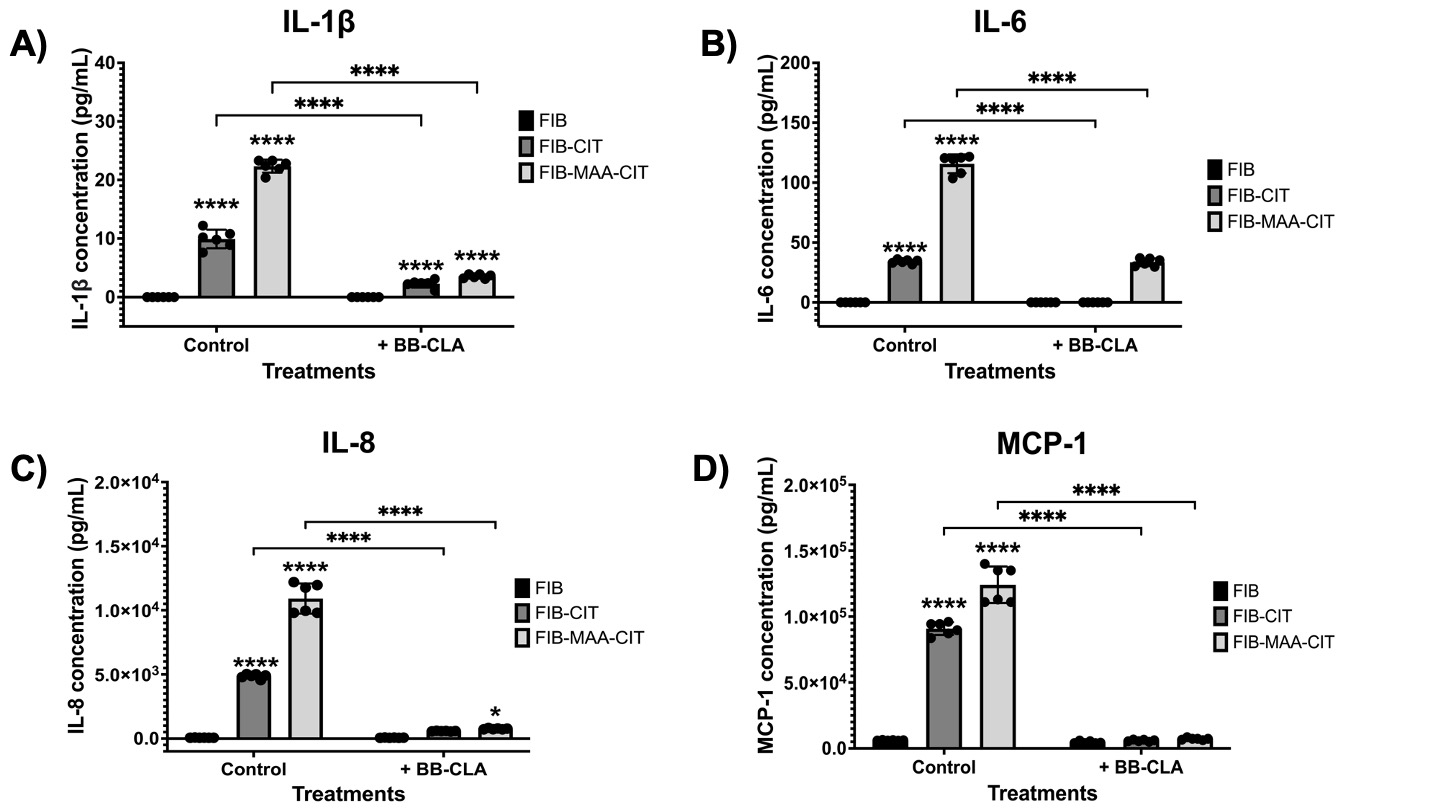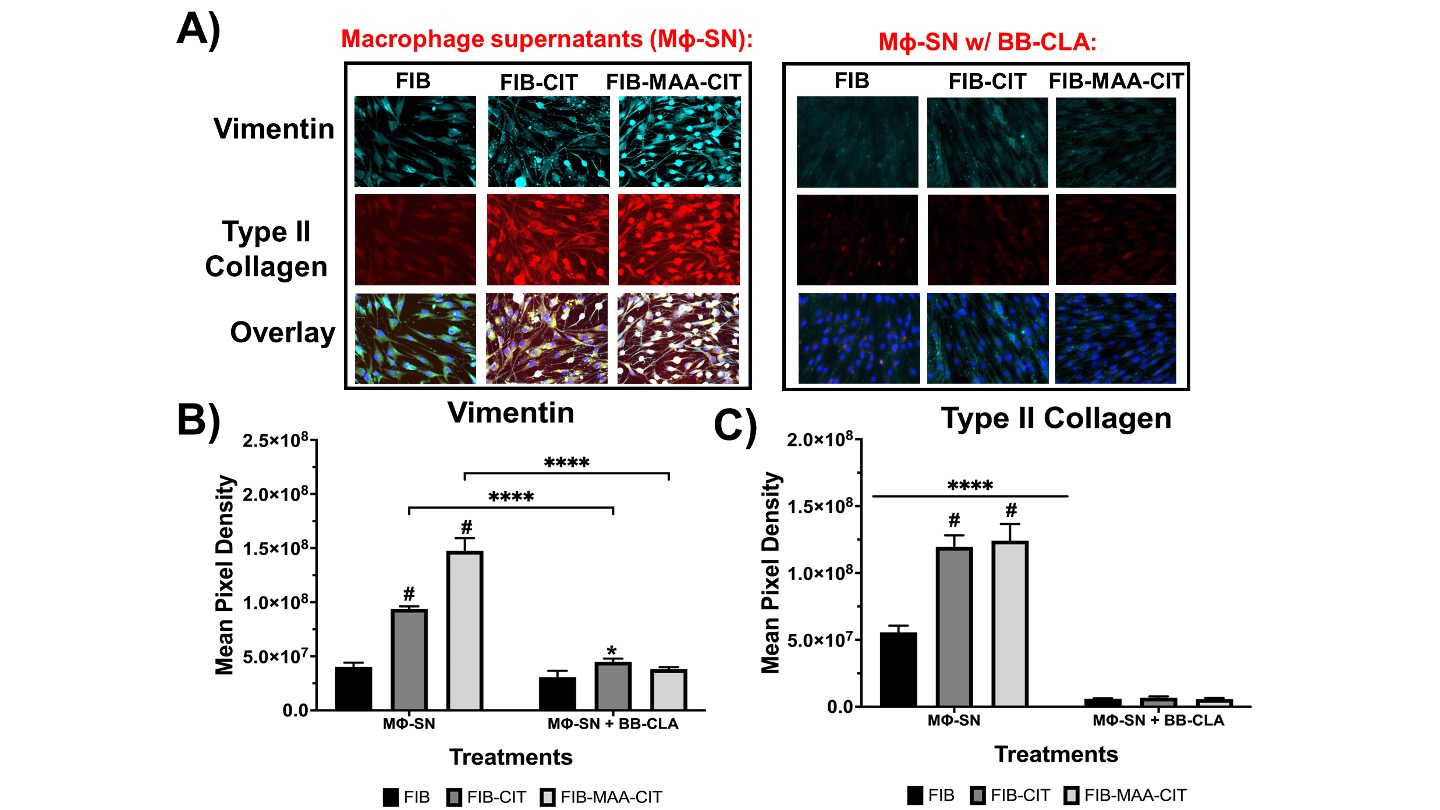Session Information
Session Type: Poster Session C
Session Time: 9:00AM-11:00AM
Background/Purpose: Peptide citrullination and adduction with malondialdehyde-acetaldehyde adduct (MAA) are post-translational modifications involved in the pathogenesis of rheumatoid arthritis (RA). Anti-cyclic-citrullinated peptide antibodies are >90% specific for the diagnosis of RA. Our laboratory has shown co-localization of MAA with citrullinated proteins in RA synovial fluid, elevated anti-MAA antibodies in RA patients, and pro-inflammatory and pro-fibrotic responses to MAA-modified antigens by macrophages in vitro. In addition, macrophages demonstrate increased expression of peptidyl arginine deiminase-2 (PAD2), an isozyme of PAD, in response to these MAA-adducted and citrullinated proteins. PAD catalyzes protein citrullination and may mediate the immunogenic transformation of synovial proteins and subsequent auto-antibody formation in RA. Here, we determine whether inhibition of PAD effects inflammatory and fibrotic markers in macrophages and RA human fibroblast-like synoviocytes (HFLS-RA) in response to stimulation with MAA and citrulline (CIT)-modified fibrinogen (FIB).
Methods: U-937 monocyte cell line was differentiated into activated macrophages by exposure to LPS, and subsequently stimulated with; unmodified FIB, FIB-CIT, or FIB-MAA-CIT in the presence (treatment group) and absence (control group) of BB-CLA (a general PAD inhibitor; PADi) for 48 hours. Supernatants collected from the media were assessed by ELISA for the pro-inflammatory cytokines; interleukin-1b (IL-1b), interleukin-6 (IL-6), interleukin-8 (IL-8), and monocyte chemoattractant protein-1 (MCP-1). HFLS from RA patients were stimulated with treatment and control supernatants from the antigen-stimulated macrophage cultures and assessed via immunofluorescent staining for the fibrotic markers vimentin and type II collagen.
Results: As previously reported, the modification of FIB with CIT and or MAA-CIT statistically increases the concentrations of the pro-inflammatory cytokines measured (Figure 1 A-D, Control). The effect of PAD inhibition on the inflammatory cytokine levels was a decrease in the secretion by stimulated macrophages of these cytokines (Figure 1 A-D, +BB-CLA) back to almost baseline levels. Examination of the HFLS cells stimulated with supernatants from macrophages activated with FIB-CIT or FIB-MAA-CIT showed an increase in both vimentin and Type II Collagen production that was significantly elevated when compared to FIB supernatant stimulation (Figure 2 A-C).
Conclusion: This study provides insight into the degree to which inflammatory and fibrotic responses from macrophages and HFLS to CIT and MAA-CIT modified fibrinogen may be PAD-mediated. Therefore, these observations strongly suggest that CIT and MAA-CIT modification of proteins play a role in the inflammatory and fibrotic responses observed in cells associated with RA development and/or progression. Additionally, they suggest that PAD inhibition is an obvious target for therapeutic intervention.
To cite this abstract in AMA style:
Mordeson J, Aripova N, Duryee M, O'Dell J, England B, Anderson D, Mikuls T, Thiele G. The Peptidyl Arginine Deiminase Inhibitor BB-CLA Decreases the Inflammatory and Fibrotic Responses in Macrophages and Rheumatoid Arthritis Synovial Fibroblasts Exposed to Fibrinogen Modified with Malondialdehyde-Acetaldehyde Adduct and Citrulline [abstract]. Arthritis Rheumatol. 2023; 75 (suppl 9). https://acrabstracts.org/abstract/the-peptidyl-arginine-deiminase-inhibitor-bb-cla-decreases-the-inflammatory-and-fibrotic-responses-in-macrophages-and-rheumatoid-arthritis-synovial-fibroblasts-exposed-to-fibrinogen-modified-with-malo/. Accessed .« Back to ACR Convergence 2023
ACR Meeting Abstracts - https://acrabstracts.org/abstract/the-peptidyl-arginine-deiminase-inhibitor-bb-cla-decreases-the-inflammatory-and-fibrotic-responses-in-macrophages-and-rheumatoid-arthritis-synovial-fibroblasts-exposed-to-fibrinogen-modified-with-malo/


